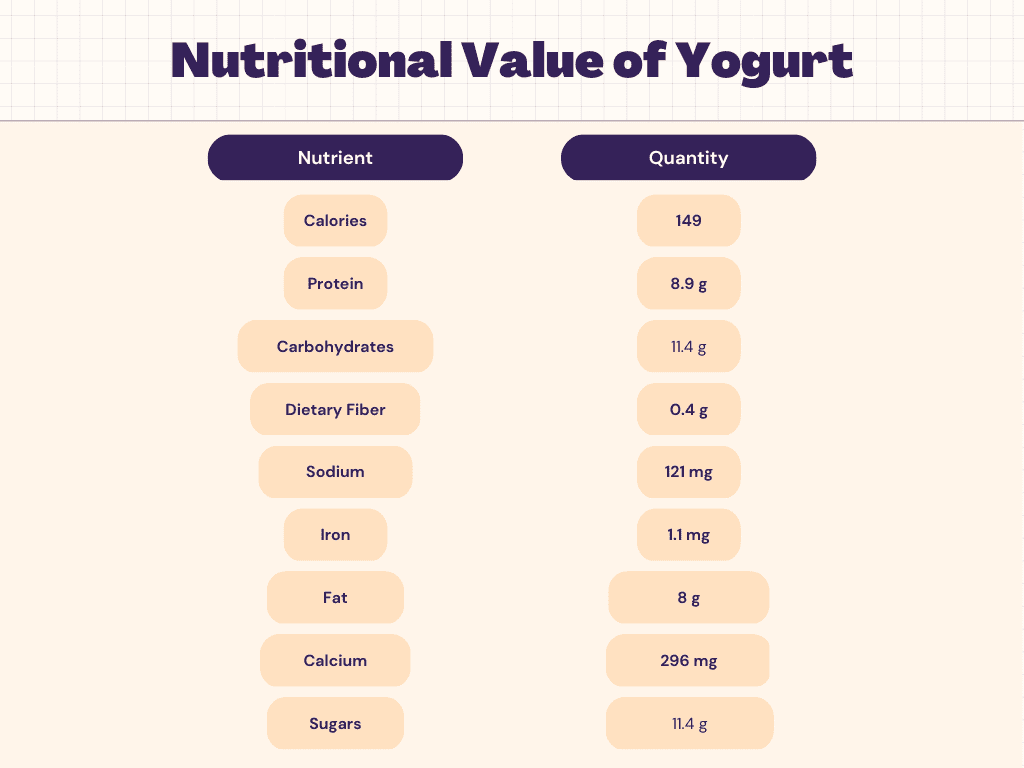Yogurt is a popular and versatile dairy product that can be enjoyed as a snack, a dessert, or as an ingredient in various recipes. In addition to its delicious taste and creamy texture, yogurt is also a good source of several key nutrients, including protein, calcium, and probiotics. The nutrient content of yogurt can vary depending on the type of yogurt and any added ingredients, such as fruit or sweeteners. In this article, we will focus on the basic nutritional profile of plain yogurt, including its calorie, protein, and carbohydrate content, to help you better understand the health benefits of this popular food.
Nutritional Value Of Yogurt
Nutritional Facts of Yogurt
Carbs In Yogurt
Yogurt is a good source of carbohydrates, which provide the body with energy. One cup (245 grams) of plain, whole-milk yogurt contains about 11.4 grams of carbohydrates, which is a relatively small amount compared to other high-carb foods. Yogurt naturally contains some sugar in the form of lactose, a type of carbohydrate found in milk. However, some types of yogurt also contain added sugars or sweeteners, which can significantly increase the carbohydrate content. For individuals who are monitoring their carbohydrate intake, it’s important to check the nutrition label to see if any sugars or sweeteners have been added. Overall, yogurt can be a healthy source of carbohydrates as part of a balanced diet, but it’s important to choose plain, unflavored varieties or those with minimal added sugars.
Protein In Yogurt
Yogurt is a good source of protein, which is an important nutrient for building and repairing tissues in the body. One cup (245 grams) of plain, whole-milk yogurt contains about 8.9 grams of protein. The protein in yogurt comes from the milk used to make it and is considered a complete protein, meaning it contains all of the essential amino acids that the body needs to function properly. Some types of yogurt, such as Greek yogurt, are higher in protein than others due to the way they are made. Greek yogurt is strained, which removes more of the liquid whey and lactose, resulting in a thicker, creamier yogurt that is higher in protein. Protein in yogurt can help promote satiety and fullness, making it a great addition to a balanced breakfast or snack.
Health Benefits Of Yogurt
Yogurt can offer a number of health benefits for individuals with PCOS, diabetes, thyroid disorders, and those looking to lose weight.
- For individuals with PCOS, yogurt can be a good source of calcium, which may help regulate menstrual cycles and improve insulin sensitivity. Check our PCOS Plans here.
- Yogurt may also help improve blood sugar control in individuals with diabetes, due to its low glycemic index and high protein content. Check our Diabetes Plans here.
- For those with thyroid disorders, yogurt can be a good source of iodine, which is important for thyroid hormone production. Check our Thyroid Plans here.
- Additionally, the probiotics in yogurt can help support a healthy gut microbiome, which has been linked to weight management and improved metabolism. Check our Weight Loss Plans here.
Consuming yogurt as part of a balanced diet and healthy lifestyle can offer a range of health benefits for many individuals. However, it’s important to choose plain, unflavored yogurt or those with minimal added sugars to maximize the health benefits.
Vitamins & Minerals in Yogurt
Yogurt is a good source of a variety of vitamins and minerals, including calcium, potassium, vitamin B12, vitamin B2, and phosphorus. Here is a summary of some of the key vitamins and minerals found in one cup (245 grams) of plain, whole-milk yogurt:
- Calcium: 296 mg, or about 30% of the recommended daily intake (RDI)
- Potassium: 410 mg, or about 9% of the RDI
- Vitamin B12: 1.4 mcg, or about 58% of the RDI
- Vitamin B2: 0.4 mg, or about 31% of the RDI
- Phosphorus: 213 mg, or about 27% of the RDI
Yogurt is also a good source of other micronutrients, such as zinc, magnesium, and vitamin B5. The nutrient content of yogurt can vary depending on the type of yogurt and any added ingredients, so it’s important to check the nutrition label to see what vitamins and minerals are present in a specific brand or variety. Overall, yogurt can be a healthy way to get a variety of essential vitamins and minerals in your diet.
The Bottom Line
Yogurt is a nutritious food that can offer a range of health benefits. It is a good source of protein and carbohydrates and can provide essential vitamins and minerals such as calcium, potassium, vitamin B12, vitamin B2, and phosphorus. The probiotics found in yogurt can also help support a healthy gut microbiome, which has been linked to weight management and improved metabolism. Additionally, yogurt may offer specific benefits for individuals with PCOS, diabetes, thyroid disorders, and those looking to lose weight. However, it’s important to choose plain, unflavored yogurt or those with minimal added sugars to maximize the health benefits.
Faqs
How much Yogurt can I eat in a day?
The amount of yogurt you can eat in a day depends on your individual calorie and nutrient needs, as well as any dietary restrictions you may have. As a general guideline, one serving of yogurt is typically around 1 cup (245 grams) or less, and it’s recommended to aim for 2-3 servings of dairy products per day. This can include yogurt, as well as milk, cheese, or other dairy products. When choosing yogurt, it’s important to check the nutrition label to see the serving size, as well as the calorie and nutrient content, to ensure you’re staying within your daily calorie and nutrient goals. It’s also a good idea to choose plain, unflavored yogurt or those with minimal added sugars to maximize the health benefits.
Should I eat Yogurt before or after exercise?
Yogurt can be a good snack option both before and after exercise, depending on your individual needs and preferences.
Before exercise, yogurt can provide a good source of carbohydrates for energy, as well as protein to help support muscle growth and repair. However, it’s important to consume yogurt at least 30 minutes to an hour before exercising to allow for digestion and to choose a low-fat option if you’re sensitive to having too much fat in your stomach before exercise.
After exercise, yogurt can help replenish glycogen stores and provide protein to support muscle recovery and repair. Consuming yogurt after exercise can also help reduce muscle soreness and aid in rehydration, due to its high water content. Again, it’s important to choose a low-fat or fat-free option to avoid too much fat and to aim for a serving size that fits within your daily calorie and nutrient goals.
Ultimately, the best time to eat yogurt before or after exercise depends on your individual needs and preferences. Experiment with consuming yogurt at different times to see what works best for you and your body.
What are the benefits of Yogurt?
Yogurt can provide a variety of health benefits, including:
- Good source of protein: Yogurt is a good source of high-quality protein, which can help support muscle growth and repair, and keep you feeling full and satisfied.
- Source of essential vitamins and minerals: Yogurt contains essential vitamins and minerals, including calcium, potassium, vitamin B12, vitamin B2, and phosphorus, which are important for overall health.
- May support a healthy gut microbiome: The probiotics found in yogurt can help support a healthy gut microbiome, which has been linked to improved digestion, immune function, and even mood.
- May help with weight management: Yogurt can be a filling and nutritious snack option that can help keep you feeling full and satisfied, which may help with weight management.
- May support bone health: Yogurt is a good source of calcium, which is important for bone health and may help reduce the risk of osteoporosis.
- May reduce the risk of certain diseases: Some studies have suggested that consuming yogurt may help reduce the risk of certain chronic diseases, such as type 2 diabetes, heart disease, and certain types of cancer.
Overall, yogurt can be a nutritious and healthy addition to your diet and may offer a range of health benefits. However, it’s important to choose plain, unflavored yogurt or those with minimal added sugars to maximize the health benefits.
What is the best time to eat Yogurt?
There’s no one-size-fits-all answer to the best time to eat yogurt, as it can be a healthy and nutritious addition to your diet at any time of day. However, there are some times when yogurt may be particularly beneficial.
For example, yogurt can be a good breakfast option as it provides a good source of protein and other essential nutrients that can help keep you feeling full and satisfied throughout the morning.
Yogurt can also make for a good snack option, especially when you’re on the go or need a quick and convenient source of nutrition. Consuming yogurt as a snack can help keep you energized and focused throughout the day.
Additionally, consuming yogurt after exercise can help support muscle recovery and repair, due to its high protein content.
Overall, the best time to eat yogurt will depend on your individual needs and preferences, as well as your daily routine and schedule. Incorporating yogurt into your diet in a way that works best for you can help ensure that you’re getting the most out of its many health benefits.










